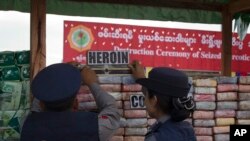Authorities in Myanmar have taken action to tackle the country’s decades-long issue with narcotics, by announcing a new drug policy that has been praised for being one of the first in Southeast Asia that takes an evidence-based approach to the issue, and focuses on the needs of the biggest victims of the country’s drug plight: the users.
For several decades, Myanmar has been beleaguered by its drug problem, an issue that has been accentuated by the country’s decades of civil wars.
A new approach to the drug problem in Myanmar
Although the total area of opium poppy cultivation in Myanmar fell by about a quarter in 2017, compared to 2015, the country remains the world’s second largest opium producer – behind Afghanistan – and recent seizures across Southeast Asia indicate it is one of the world’s largest producers of methamphetamine.
Like many countries across Southeast Asia, Myanmar currently dishes out harsh sentences to drug users. Those caught in possession of a small amount of drugs for personal use face the potential of a 10-year prison sentence.
According to a 2016 report published by Dutch think-tank Transnational Institute, about a quarter of Myanmar’s 60,000 prisoners are incarcerated for drug-related offenses.
Less punitive drug policy
The National Drug Control Policy, developed in collaboration with the United Nations Office on Drugs and Crime, recommends responses that are health- and human rights-focused, establishes a path for sustainable alternative development for opium farmers, and promotes international cooperation. It is also the first time Myanmar has adopted a policy that takes a harm reduction approach to the drugs issue.
“Our past approach was very focused on supply reduction and less on other issues, and as a result it did not achieve everything we had planned,” said Lieutenant General Kyaw Swe, Minister for Home Affairs, at the policy’s launch. “By working with the UNODC and adopting best practice approach, we believe we will have much better results for the people and the country.”
The new policy has largely been welcomed by civil society groups and NGOs who have been advocating for a more progressive drugs policy in Myanmar.
Other notable components of the new policy include investing in research and analysis to better understand the drugs issue, introducing development programs in drug producing areas, and making mental health services available to young people.
“We welcome this new drug policy,” said Nang Pann Ei Kham, coordinator of Drug Policy Advocacy Group-Myanmar. “This new policy is comprehensive; it not only looks at the demand supply side of the drug issues in Myanmar. It focuses on public health and human rights and also development perspectives, rather than law enforcement.”
“The punitive non-rights approach didn’t work. This policy is a way forward to help solve these drug problems,” she told VOA.
Rehab for drug users
Sai Aung Kham, vice chairman of the National Drug Users Network, said he was encouraged by the recommendation that drug users be provided with rehabilitation programs.
“Sending users to prison is not a proper solution for this problem,” said Sai Aung Kham, adding that a friend of his was recently arrested for being found in possession of heroin. “Currently, if you are found with more than three grams of drugs, you can be charged … and sentenced to more than 20 years in prison, accused of drug dealing.”
Troels Vester, UNODC Country Manager in Myanmar, also praised the new policy, saying Myanmar has become the first country in Southeast Asia to adopt a drugs policy that follows the approach of the United Nations General Assembly Special Session on the World Drug Problem.
“There are a lot of good components in this policy,” he told VOA. “Many of these steps are positive. Harm reduction, the removal of compulsory registration [of drug users], prevention efforts, and a shift from punitive to a more human-oriented approach.”
There is still a lot of work to do
Despite the widespread praise, stakeholders recognize the new policy is just one step towards tackling the country’s rampant drug problems.
“I would say it’s very much going in the right direction, but we can’t celebrate fully yet. A key question is how to implement this,” said Vester, adding he hoped to work alongside civil society and NGOs to improve the capacity of drug treatment centers in Myanmar.
He said the government has set a 100-day deadline to establish an instruction – in the form of a decree or strategy – to distribute to police officers and health workers around the country in how to implement the policy on the ground.
“Myanmar is a very big country. So it’s one thing to create a law, but if you’re a low-ranking police officer in [rural Myanmar], do you know about this?” he said.
Nang Pann Ei Kham, from the Drug Policy Advocacy Group, said one challenge is the country’s drug law, which is not as progressive as the policy.
“I hope this new policy will be implemented effectively. Along the way, [the government] must work closely with civil society, and especially those communities that are affected by this issue.”













